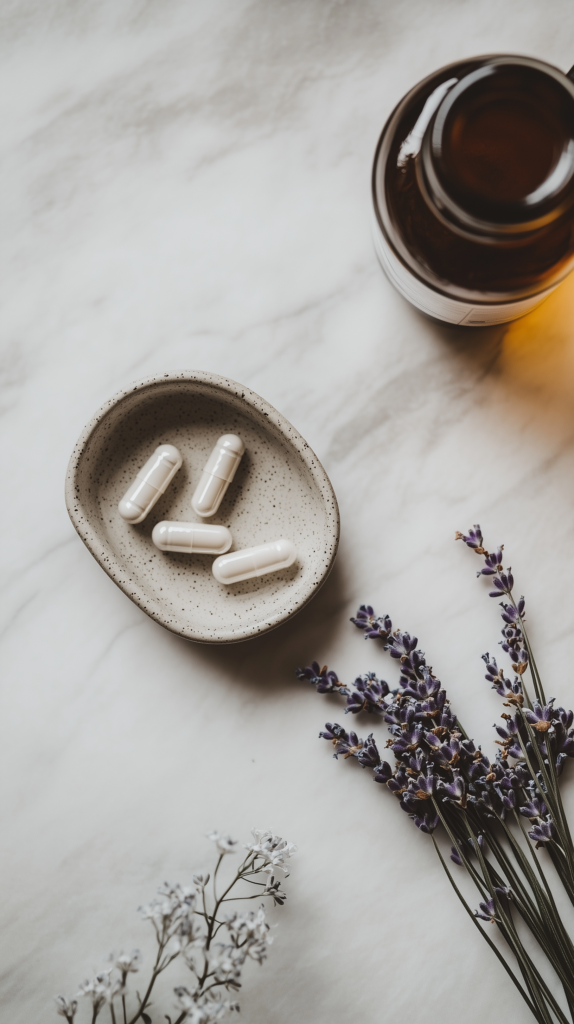This post may contain affiliate links, including those from Amazon Associates. If you make a purchase through these links, I may earn a commission at no additional cost to you. Learn more about our affiliate policy.
There’s nothing more frustrating than lying awake at night, staring at the ceiling, while your mind races and sleep feels impossible. I’ve been there. For years, I struggled with getting consistent, restful sleep. Whether it was waking up in the middle of the night and letting my brain start up or tossing and turning for hours, it left me feeling drained and irritable the next day.
I’ve learned after much trial and error that the best remedies are often the ones you don’t expect. Deep restful sleep is an essential building block of a holistic lifestyle. Turns out, nature has some pretty incredible remedies built right into it, and many of them were completely off my radar until I started exploring natural solutions.

Did you know that nearly 70 million Americans struggle with sleep issues? It’s no wonder, with how much stress and screen time we all juggle in our modern lives. You don’t have to settle for restless nights though. Part of rooting back into nature is to allow what it is already providing to come into our awareness.
Staying open to the fact that there’s a world of natural sleep solutions you might not have considered.
In this post, I’ll share 7 unexpected natural remedies that have transformed my sleep routine, and might just change yours too. These aren’t your typical “drink chamomile tea and call it a day” suggestions.
As you explore these remedies, you might also enjoy my guide to the 10 Most Affordable Natural Sleep Aids on Amazon, where I’ve rounded up simple, budget-friendly options that can support deeper, more restorative sleep.
1. Magnesium: The Sleep Mineral You Might Be Missing

I used to wonder if something as simple as magnesium could really make a difference in sleep. It seemed too good to be true until I started looking into it.
With our modern food supply lacking the rich minerals it once had, it’s no surprise that so many people are unknowingly deficient. And since magnesium plays a key role in relaxation, nervous system regulation, and even melatonin production, getting enough can be a game-changer for deep, restorative sleep.
The Best Ways to Use Magnesium for Sleep
When it comes to choosing magnesium, the variety of options can feel overwhelming. I’ve found that instead of focusing on just one form, the body responds beautifully to a blend.
Different forms of magnesium support us in slightly different ways, some ease muscle tension, others soothe the nervous system, and together they create a more complete sense of calm.
Over time, I’ve experimented with many brands and narrowed it down to a couple that I keep coming back to. Both are easy on the stomach, thoughtfully formulated, and have made a noticeable difference in my sleep rhythms.
- Micro Ingredients Pure Magnesium Complex
This one combines glycinate, malate, and taurate, with a little added vitamin C to help with absorption. I love that it’s made simply, without fillers, and gives me steady support for relaxation in the evenings. - Vitalitown Magnesium Complex
This blend includes four forms — glycinate, malate, taurate, and citrate — offering a slightly broader spectrum. It’s been a solid choice for nights when I want that extra layer of nervous system support, and I appreciate that it’s vegan and non-GMO.
I usually take magnesium about an hour before bed, somewhere between 200–400 mg depending on what my body feels like it needs that night. It’s become one of the simplest and most reliable ways I help my body soften into rest.
2. Yoga Nidra: A Sleep Meditation for Your Nervous System
Over the past year, Yoga Nidra has been a total game-changer for me. If I wake up in the middle of the night, usually around 3 a.m., and can’t seem to fall back asleep, I grab my sleep mask, put on headphones, and dive into a one-hour (or longer) Yoga Nidra meditation. Even if I don’t make it back into deep sleep, my body feels noticeably more rested than if I just lay there, frustrated, trying to will myself back to sleep.
Yoga Nidra, or “yogic sleep,” is an ancient relaxation practice that’s all about lying comfortably and letting your mind unwind. There’s no need for yoga poses or any fancy equipment, just a willingness to follow along and let your body relax deeply.
How does Yoga Nidra improve sleep quality?
For me, Yoga Nidra has been invaluable during those sleepless early-morning hours. It’s especially helpful for reducing the stress and racing thoughts that often keep me awake. Even on nights when I don’t fully fall back asleep, I wake up feeling calmer and more refreshed because my body has had the chance to rest deeply.
How to Practice Yoga Nidra for Improved Sleep
It’s incredibly easy to incorporate Yoga Nidra into your routine:
- Find a comfortable place to lie down, like your bed or a yoga mat.
- Put on a sleep mask and headphones to block out distractions.
- Use a guided session to lead you through the practice. My favorite Yoga Nidra YouTube channel is embedded below. It’s an amazing resource for anyone looking to try this practice.
3. Herbal Teas: Nature’s Calming Elixirs
Over the past year, I’ve discovered that certain herbal teas can be a delightful and effective addition to my nightly routine, helping me unwind and prepare for restful sleep.
Which herbal teas are most effective for improving sleep?
- Chamomile: Known for its calming effects, chamomile contains apigenin, an antioxidant that binds to receptors in the brain to promote relaxation and reduce insomnia.
- Valerian Root: Traditionally used to treat insomnia, valerian root may improve sleep quality by increasing levels of gamma-aminobutyric acid (GABA), a neurotransmitter that promotes relaxation.
- Passionflower: Some studies suggest that passionflower tea can improve subjective sleep quality, making it a potential natural remedy for sleep disturbances.
- Lavender: The soothing aroma of lavender tea has been associated with improved sleep quality, making it a popular choice for bedtime relaxation.

My favorite sleep teas
- Anima Mundi Calm Stress Relief Tonic Tea
A heart‑softening loose‑leaf blend with chamomile, milky oats, tulsi, rose, and ashwagandha. Gentle, grounding, and lovely for evening wind‑down. - Traditional Medicinals Organic Nighty Night Extra with Valerian
Valerian‑forward and caffeine‑free. Non‑GMO, certified organic, with an earthy mint profile that eases the body toward rest. - Grace Farms Rest Chamomile Vanilla Tea
A soothing organic blend of chamomile, vanilla, reishi, and ashwagandha. This tea carries both softness and depth, pairing calming flowers with adaptogenic herbs and mushrooms for a grounded, nourishing evening ritual.
Preparation Tips for Maximum Relaxation
To make the most of these herbal teas without disrupting your sleep:
- Timing: Enjoy your tea about 30 to 60 minutes before bedtime to allow your body to absorb the calming compounds.
- Temperature: Opt for warm, not hot, tea to prevent raising your core body temperature, which can interfere with sleep onset.
- Avoid Additives: Skip sugar and caffeine, as they can counteract the calming effects. If you prefer a bit of sweetness, consider a small amount of honey.
- Mindful Consumption: Sip your tea slowly in a calm environment, perhaps while reading or listening to soft music, to enhance the relaxation experience.
4. Collagen Peptides: Sleep from the Inside Out
One of my favorite sleep hacks is adding 1–2 scoops of collagen peptides to my nightly herbal tea. It’s such a simple addition, but it’s made a noticeable difference in how rested I feel the next morning. Plus, it doesn’t alter the taste of my tea, making it an effortless part of my routine.
How do collagen peptides affect sleep patterns?
Collagen peptides are rich in glycine, an amino acid known for its calming effects on the brain and body. Glycine helps regulate your body temperature, which is essential for initiating and maintaining deep sleep. Studies have shown that consuming around 3 grams of glycine before bed can improve sleep quality, shorten the time it takes to fall asleep, and leave you feeling more refreshed the next day.
How to Use Collagen Peptides for Better Rest
The best part about collagen peptides is how easy they are to incorporate into your bedtime ritual. Here’s how I use them:
- Add 1–2 scoops of collagen peptides to your evening herbal tea or warm milk. They dissolve easily and blend seamlessly into most drinks.
Not only do collagen peptides support better sleep, but they also come with added benefits for skin, hair, and joints. It’s a win-win addition to your routine, helping you relax and wake up feeling rejuvenated.
My go‑to collagen peptides
- Vital Proteins Grass‑Fed Collagen Peptides
Hydrolyzed, unflavored, and easy to dissolve. Reliable amino acid profile with plenty of glycine. I use this when I want a completely neutral mix‑in for tea or moon milk. - Great Lakes Wellness Collagen Peptides
Fast‑absorbing, unflavored, and non‑GMO. Consistent texture and gentle on the stomach. A solid everyday option for nightly wind‑down. - Anthony’s Grass‑Fed Collagen Peptide Powder
Pure hydrolysate from pasture‑raised cattle, unflavored and gluten free. Budget friendly without fillers. Blends smoothly into warm drinks for a simple glycine boost before bed.
5. Epsom Salt Baths For a Warm Reset
If you’re looking for a soothing, all-in-one way to relax before bed, an herbal Epsom salt bath might be just what you need. It’s one of my favorite evening rituals when I feel tense or restless. Not only does it help calm my mind, but I’ve noticed how much better my body feels after soaking in one of these mineral-rich baths.
Why Epsom Salt Baths Work
Epsom salts, made of magnesium sulfate, are absorbed through the skin when dissolved in warm water. Magnesium plays a key role in relaxing the nervous system and muscles, promoting restful sleep.
The warmth of the bath also helps lower your core body temperature post-soak, signaling to your brain that it’s time to wind down. Many people even find that Epsom salt baths improve skin hydration and reduce irritation, making it a relaxing and restorative experience.

How to Prepare an Epsom Salt Bath for Sleep
Here’s my step-by-step guide to creating the perfect pre-bedtime soak:
- Fill your bathtub with warm water: not too hot, as excessive heat can be stimulating.
- Add 1–2 cups of Epsom salts to the water and stir to dissolve completely.
- Optional: Enhance your bath with a few drops of calming essential oils like lavender or chamomile for an added relaxation boost.
- Soak for 15–20 minutes, letting your body fully relax.
- After your bath, dry off gently, put on cozy pajamas, and ease into bed.
Customize your bath for your mood with these 10 Unique Epsom Salt Bath Recipes for Deep Relaxation.
6. Weighted Blankets: A Hug for Your Sleep
Over the past year, I’ve found that incorporating a weighted blanket into my nightly routine has significantly improved my sleep quality.
How do weighted blankets improve sleep?
Weighted blankets utilize deep pressure stimulation, which mimics the sensation of a gentle hug. This pressure can increase the production of serotonin and melatonin – hormones that promote relaxation and sleep – while reducing cortisol, the stress hormone. The result is a calming effect that can help alleviate stress and improve sleep quality.
How to Choose the Right Weighted Blanket
When selecting a weighted blanket, consider the following tips:
Size: Ensure the blanket fits your bed and covers you adequately without hanging over the sides, as this can cause it to slide off during the night.
Weight: A common guideline is to choose a blanket that is about 10% of your body weight. This ensures the pressure is effective yet comfortable.
Materials: Look for breathable fabrics like cotton or bamboo, especially if you tend to sleep hot. Some blankets also come with removable, washable covers for easy maintenance.
7. Melatonin-Free Sleep Supplements
Melatonin-Free Supplements For Gentle Sleep Support
In my quest for better sleep, I’ve explored using melatonin. But it always left me feeling groggy in the mornings and not well rested. There are many melatonin-free supplements that offer gentle support without the potential side effects associated with melatonin. Here are some options I’ve found effective:
Valerian Root
Valerian root is an herbal remedy traditionally used to alleviate insomnia and anxiety. It is believed to increase gamma-aminobutyric acid (GABA) levels in the brain, promoting relaxation and reducing the time it takes to fall asleep. Studies suggest that taking 300–600 mg of valerian root before bedtime may improve sleep quality.
GABA (Gamma-Aminobutyric Acid)
GABA is a neurotransmitter that inhibits nerve activity in the brain, fostering a calming effect. Supplementing with GABA may help reduce anxiety and improve sleep by enhancing relaxation. While more research is needed, some individuals report better sleep quality when taking GABA supplements before bed.
L-Theanine
L-theanine, an amino acid found in tea leaves, promotes relaxation without causing drowsiness. It may enhance sleep by increasing GABA, serotonin, and dopamine levels in the brain. Doses ranging from 200–400 mg before bedtime have been associated with improved sleep quality.
Conclusion: Sleep the Natural Way
Sleep is an essential part of a holistic lifestyle, but it doesn’t always come easily. The good news is that natural remedies like magnesium, Yoga Nidra and herbal teas can offer gentle, effective support. These solutions have helped me personally and are backed by science, not to mention centuries of tradition.
The key is finding what works best for you. Experiment with one or two remedies at a time, and stay consistent with them to notice the effects. A well-curated bedtime routine can transform your sleep and leave you feeling refreshed and energized each morning.
Remember, your journey to better sleep is unique, and the solutions that feel natural and restorative for you are the ones worth sticking to.
Frequently Asked Questions About Natural Sleep Remedies
What are the most effective natural sleep aids?
The effectiveness of natural sleep aids depends on your individual needs. Magnesium, CBD, and valerian root are excellent for reducing stress and promoting relaxation, while Yoga Nidra and Epsom salt baths help calm the nervous system. Experiment to find what resonates with your body.
Are natural sleep remedies safe?
Most natural remedies are considered safe for general use, but it’s always a good idea to consult with a healthcare professional, especially if you’re taking medications or have underlying conditions. Start with low doses and follow product instructions.
Does magnesium actually help improve sleep quality?
Yes, magnesium plays a critical role in promoting restful sleep. It helps regulate melatonin, the hormone responsible for sleep-wake cycles, and increases gamma-aminobutyric acid (GABA), a neurotransmitter that calms the nervous system. Studies show that magnesium supplementation can reduce the time it takes to fall asleep and improve sleep quality, particularly for individuals with magnesium deficiencies. Incorporating magnesium-rich foods or supplements into your routine can be a natural and effective way to support better sleep.
Can valerian root improve sleep quality?
Valerian root has been shown to enhance sleep quality by increasing GABA levels in the brain, which promotes relaxation. Taking 300–600 mg before bedtime may help you fall asleep faster and sleep more soundly.
Do chamomile tea and lavender really help with sleep?
Yes, chamomile tea contains apigenin, which binds to brain receptors that promote relaxation, while lavender’s soothing aroma can improve sleep quality. Both are excellent, gentle options for winding down before bed.
What lifestyle changes can improve sleep naturally?
In addition to the remedies listed, maintaining a consistent sleep schedule, limiting screen time before bed, and creating a calming bedtime routine can all support better sleep. Small, consistent changes often have the most lasting impact.



